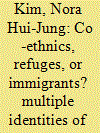| Srl | Item |
| 1 |
ID:
147858


|
|
|
|
|
| Summary/Abstract |
The articles in this Special Issue critically examine a number of key aspects of North Koreans who have fled their home state and sought a new life in the ‘other’ Korea. The articles examine the landscape of government policy for North Koreans, the role of civil society and the media, and the lived experiences of North Koreans in South Korean society. The central theme of the Special Issue is the contentious politics of choosing and articulating identity categories; what kinds and by whom identity categories are imposed upon North Koreans and how North Koreans interpret these identity categories and strategically employ them. The Special Issue makes significant empirical and theoretical contributions to our understanding of North Koreans in South Korea and on the complex issue of ethnic boundary drawing.
|
|
|
|
|
|
|
|
|
|
|
|
|
|
|
|
| 2 |
ID:
124580


|
|
|
|
|
| Publication |
2013.
|
| Summary/Abstract |
Purpose-This article explores human rights and refugee status of the North Korean diaspora, with particular focus on the social construction of refugee rights.
Design/methodology/approach-The study analyzes the realities of the unstable status of the North Korean refugees in Asian and Western countries by focusing on the discrepancy between refugee rights and refugee status. Legal, political, diplomatic, and social issues around North Korean refugee status are examined by conducting an examination of the related countries' political discourses and actual policies.
Findings-North Korean escapees in Northeast and Southeast Asia have lived in hiding from forced repatriations by the PRC and neighboring countries, vulnerable to human rights violations. While North Koreans in South Korea have been granted legal citizenship, many North Korean asylum seekers staying in other countries have not been under legal or humanitarian protection. Although the concerned states are under pressure from the international community advocating universal human rights of North Koreans, they enforce refugee policies pursuing their own political and economic interests. Thus, the status of North Koreans is unstable and threatened when refugee rights are politically constructed by the concerned states' political and economic interests as well as by international relations.
|
|
|
|
|
|
|
|
|
|
|
|
|
|
|
|
| 3 |
ID:
147862


|
|
|
|
|
| Summary/Abstract |
This article compares North Korean immigrants and foreign bride policies in South Korea. Despite being constructed as distinctive policy target groups, North Korean settlement and foreign bride incorporation policies exhibit striking similarities. The similarities result from the way policy problems are identified and certain solutions are justified; both North Korean immigrants and foreign brides are constructed a burden on welfare and as potential threats to social stability. Policy solutions are justified as they are designed to transform North Korean immigrants and foreign brides into ‘normal’ South Korean citizens. The major difference between two sets of policies lies in assumptions regarding cultural differences. Foreign brides are assumed to carry practices that are foreign and alien to Koreans, while North Korean immigrants are presumed to carry ‘authentic’ and ‘traditional’ Korean culture. Foreign brides’ cultures are visible and alien to South Koreans, and therefore are addressed under the banner of multiculturalism policies. North Korean immigrants are excluded from such policies. This exclusion reflects and reproduces the view of a Korean nation bounded by ethnic and cultural homogeneity.
|
|
|
|
|
|
|
|
|
|
|
|
|
|
|
|